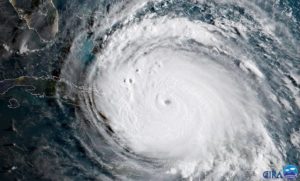Special to WorldTribune.com
The two recent horrendous storms have settled the continuing argument about climate change, although neither side in what has been the recent lively and costly dispute in time and energy may recognize it.
Our argument begins with the fact that it is hard to exaggerate the force of these weather movements. Granted that both storms set new records or hark back several generations to other high records, and therefore are unusually severe, what they do demonstrate is the power of Mother Nature at what may or may not be its maximum strength. That is to say, much weaker storms, too, exhibit the power of natural forces around us and our inability to control them.

Any human activity, whether in support of life or destructive of it, for the most part fade into insignificance totally in comparison.
That there is climate change has never been in dispute. We have considerable evidence accumulated in relatively recent times about these changes, remembering always that our historical records are short considering the ages we are talking about
The argument has been to what extent human activity impacts on the weather to create or alter it in the longer-term climate.
What the storms have demonstrated for any who will take a moment to think about it, is that any human activity is puny in comparison with the strength of Mother Nature and its capacity to change the weather, whether temporarily or over a longer time. These storms are of such magnitude as to put that issue out of the question.
The argument is arcane, of course. It has always been. But its implications are important.
Those who have argued that human activity – whether intentional or simply coincidental to our increasingly sophisticated industrial and post-industrial livelihood – has a profound effect and alters the climate over the longer term. Therefore, it is argued, public policy must be based on an assumption that human activity can greatly affect the longer term climate development.
But the force these storms, and many of much less intensity, demonstrates that human activity whatever it may be, is relatively insignificant compared with the forces of Mother Nature which are totally beyond our control.
The deduction that must be drawn from this common sense analysis of the changes in the weather, whether short or long-term, is that our ability to coordinate our activity as to affect the climate, the longer or shorter effects, is extremely limited in comparison to the strength of weather events totally beyond our control such as these storms.
That does not mean, of course, that we should avoid all environmental concerns in connection with our industrial activity. But it does mean that we must be realistic about how far we should go in curbing the benefits of any activity in order to attempt to affect the weather, or even a more ambitious aim, climate control.
Such an analysis of our policy decisions would be, of course, difficult as it is in formulating all economic and social policy.
But it does suggest that activists may have been exaggerating our ability to control the weather and therefore the climate. It may add substance to the argument that some of the policy initiatives we have taken in that regard are not only virtually meaningless in their effect but also costly to our over all income and our way of life.
Sol W. Sanders, (solsanders@twc.com), is a contributing editor for WorldTribune.com and Geostrategy-Direct.com.
Subscribe to Geostrategy-Direct __________ Support Free Press Foundation

